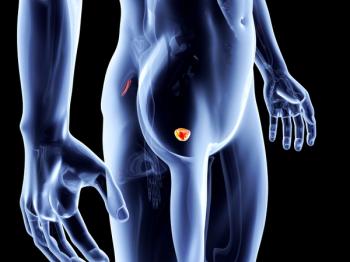
Increased Risk of Aggressive Prostate Cancer in Testicular Cancer Survivors
Patients with a history of testicular cancer had a fivefold higher risk of developing aggressive prostate cancer when compared with those with no history of testicular cancer.
Men with a history of testicular cancer had a nearly fivefold higher risk for later developing prostate cancer than did men without a history of testicular cancer, including an increased risk for developing intermediate- and high-risk disease, according to the results of a case control study.
“Based on these findings, men with a history of testicular cancer should consider a discussion regarding the risks and benefits of prostate cancer screening with their physicians,” said Mohummad Minhaj Siddiqui, MD, an assistant professor of surgery at the University of Maryland School of Medicine and director of urologic robotic surgery at the University of Maryland Marlene and Stewart Greenebaum Cancer Center.
Siddiqui presented the results of the study (
Previous research has demonstrated that there is an increased rate of prostate cancer in men with a history of testicular cancer. Siddiqui and colleagues sought to determine if men with a history of testicular cancer also had an increased risk for intermediate- to high-risk prostate cancers.
The study looked at data from 32,435 men with a history of testicular cancer and 147,044 men with a history of melanoma from the Surveillance, Epidemiology, and End Results (SEER) database. According to the researchers, men with a history of melanoma were chosen as the control group because there is, to their knowledge, no association between melanoma and prostate cancer. Men older than 40 were considered for this study to allow for sufficient age for prostate cancer to be diagnosed.
The overall incidence of prostate cancer by the age of 80 was significantly higher among the men with a history of testicular cancer compared with the men with a history of melanoma (12.6% vs 2.8%; P < .0001). Survivors of testicular cancers also had a higher incidence of intermediate- or high-risk prostate cancer compared with the control group (5.8% vs 1.1%; P < .0001).
Analyses showed that men with a history of testicular cancer had 4.7-fold increased risk for all prostate cancer and 5.2-fold increased risk for intermediate- and high-risk prostate cancer (P < .0001 for both).
“We looked at alternate risk factors, such as age, race, and radiation history, and found that even when controlling for the influence of these risk factors there was still increased risk of developing intermediate- to high-risk prostate cancer in men with a history of testicular cancer as opposed to the control population,” Siddiqui said.
Newsletter
Stay up to date on recent advances in the multidisciplinary approach to cancer.














































